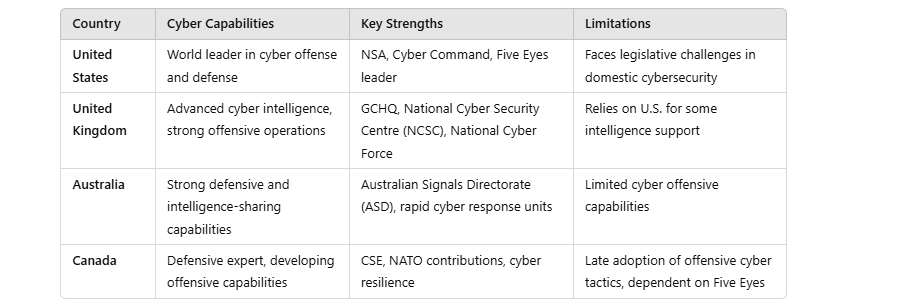QUICKLOOK: U.S.-Canada Cyber Relationship Under Strain
Tariffs, Intelligence-Sharing Disputes, and a Fractured Cybersecurity Partnership Threaten North American Security
BLUF (Bottom Line Up Front)
The deteriorating relationship between the U.S. and Canada threatens cybersecurity cooperation, intelligence-sharing, and digital security policies. The Five Eyes alliance, which heavily relies on trust, faces potential fractures, weakening real-time cyber threat intelligence. Economic and policy divergences could slow joint cyber defense strategies, affecting shared infrastructure, military collaboration, and response coordination. Canada’s cyber capabilities are strong, but a rift with the U.S. may force it to seek alternative partnerships, altering global cybersecurity dynamics.
Abstract
A strained U.S.-Canada relationship impacts multiple areas of cybersecurity and intelligence cooperation. The Five Eyes alliance—comprised of the U.S., Canada, the UK, Australia, and New Zealand—relies on seamless intelligence-sharing, which could be disrupted if political tensions escalate. Canada has historically provided valuable cyber intelligence and defensive capabilities, particularly in protecting critical infrastructure and countering cyber threats.
However, recent U.S. policies, including proposed tariffs and shifts in diplomatic rhetoric, have stressed joint cyber efforts. Diverging security policies could weaken synchronized responses to cyberattacks, create operational gaps in North American defense, and increase vulnerabilities in critical infrastructure. Canada, which has been expanding its cyber capabilities through the Communications Security Establishment (CSE) and the Canadian Armed Forces Cyber Command, may look to strengthen ties with European and NATO partners if trust with the U.S. erodes.
A comparative analysis shows that while Canada has a strong cyber defense posture, it lags behind the UK and U.S. in offensive cyber operations. Australia’s robust intelligence-sharing framework within Five Eyes has allowed it to play a key role in cyber deterrence, while Canada remains more focused on defensive measures. A breakdown in the U.S.-Canada cyber relationship could shift the balance of cybersecurity power within Five Eyes and alter Canada’s strategic alliances.
Assessment and Analysis
1. The Impact on Five Eyes Intelligence Sharing
The Five Eyes alliance is built on seamless intelligence flow. A deteriorating U.S.-Canada relationship could lead to a trust deficit, reducing real-time cyber threat intelligence exchanges (Source).
There have been discussions about excluding Canada from Five Eyes as a leverage tactic, which experts warn would “undermine trust” and weaken intelligence-sharing capabilities (Source).
Reduced intelligence-sharing would limit Canada’s access to high-level U.S. cyber intelligence and degrade North America’s cyber readiness.
2. Cyber Defense and Policy Coordination Challenges
Canada and the U.S. have historically collaborated on critical infrastructure protection, especially in shared networks like the power grid. A rift could slow joint responses to cyber threats and weaken defenses against adversaries targeting both countries.
The U.S.-Canada Cybersecurity Action Plan fosters information-sharing, but political instability could stall cooperation and delay joint cybersecurity initiatives (Source).
A divergence in policies (e.g., 5G security regulations, AI governance, data privacy laws) could lead to mismatched cybersecurity strategies, increasing operational inefficiencies and security gaps.
3. Canada’s Cyber Capabilities in a Global Context
Canada’s Strengths
The Communications Security Establishment (CSE) leads Canada’s cyber defense, focusing on intelligence collection and cyber threat mitigation.
The Canadian Armed Forces Cyber Command (CAF Cyber Force) is scaling up, with recent initiatives to expand offensive cyber capabilities (Source).
Canada is actively involved in NATO cyber defense, contributing to missions like protecting Ukraine and Baltic allies from cyber threats.
Comparison with Other Allied Nations
The UK and Australia have stronger offensive cyber capabilities than Canada due to early investments in active cyber operations.
Canada relies on intelligence-sharing with Five Eyes, meaning any disruption with the U.S. could force Canada to seek deeper cooperation with NATO and the EU.
4. Strategic Shifts and Policy Implications
Canada may strengthen European and NATO cyber partnerships if U.S. relations decline, potentially altering its position within Five Eyes.
A weakened U.S.-Canada alliance could result in less coordinated cyber deterrence efforts, leaving openings for adversarial nations like China and Russia to exploit gaps in North American cybersecurity.
Canada’s National Cyber Security Strategy (2025) focuses on building sovereign cyber capabilities, which may accelerate if U.S. support declines (Source).
Conclusion
The U.S.-Canada cybersecurity relationship is at risk due to broader diplomatic and economic tensions. A breakdown in trust could lead to reduced intelligence-sharing, policy misalignment, and weakened joint cyber defense strategies. Despite its strong cyber resilience, Canada remains heavily reliant on Five Eyes cooperation. If U.S. tensions persist, Canada may pivot towards NATO and EU partnerships, shifting global cyber dynamics. Maintaining a strong cyber alliance is critical to North American security and the collective defense against global cyber threats for both nations.





